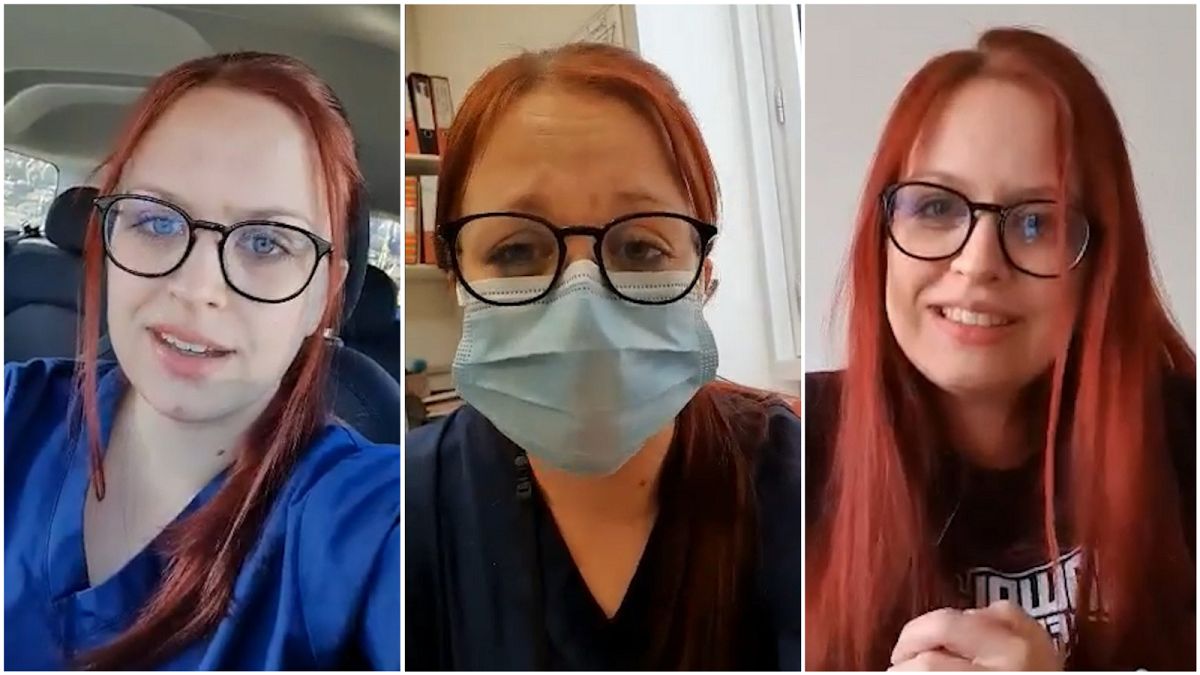'You can lose the personal touch' says a British palliative care doctor as she took Euronews through her day treating end-of-life patients during a pandemic.
Coronavirus has clearly posed a major challenge for healthcare workers on the whole, with maybe some lesser-known effects on those in palliative medicine.
End-of-life care is already a sensitive role in its field, and amid a pandemic of an illness that requires doctors to wear clinical face coverings while they're having difficult conversations with patients, this role has become even more challenging.
But in this series of video diaries for Euronews, one British palliative care doctor has given us a brief snapshot of how she has adapted to these difficulties in her day as an end-of-life medic in a pandemic.
What is palliative medicine?
Jamie Mayers works for the National Health Service (NHS) in the UK as a palliative care doctor.
It's part of a medical speciality that works to give support and improve the quality of life to people who have terminal illnesses.
"Patients may be in the last years of their life; maybe their last month, or even the last days of life," Jamie said.
'I am mostly seeing patients with COVID-19'
Kitted out with a full outfit of personal protective equipment (PPE), Jamie said she would mostly be seeing to people with COVID-19 nowadays - although she would be visiting others without the disease, too.
"Since the COVID-19 pandemic, we're all wearing our surgical masks," she said, adding: "When I actually go in to see a patient, I'll be wearing my mask, goggles, apron and gloves.
What difficulties has PPE posed when treating patients?
A conversation about dying "can lose that personal touch" when it's being had through masks and goggles, according to Jamie, who has since learned to rely on communicating facial expressions through her eyes, and by concentrating on her tone of voice.
Patients who are hard of hearing can get particularly stuck if they rely on lip-reading, Jamie said, as they can no longer see her mouth when she talks.
She said: "In palliative medicine, a lot of what we do is about conversations and talking — particularly difficult conversations, for example, about death and dying [...]
"It's a very different way of working; it's a very different way of interacting with each other.
"And while we know it's for safety — there's a good reason we're doing it — it's definitely something different and something that we've had to get used to."
Phone calls for palliative-type conversations are not the same as in-person meetings
On Thursday afternoons, Jamie would usually run a clinic for patients to discuss sensitive topics such as becoming seriously unwell, or, ultimately, death — but the coronavirus outbreak has now forced these talks to migrate to a telephone call.
"Doing that over the phone and not being able to look a person directly in the eye; not being able to hold a hand if you need to, and not being able to have this personal approach [...] has proved really difficult," Jamie said.
She added: "It's certainly something that I've had to adapt to know many of my colleagues have had to adapt to as well."
Holding a dying patient's hand — even with your gloves on — is important
Coronavirus has forced family members to make difficult decisions about their priorities — whether that's to choose their own health or to potentially sacrifice this health to visit a loved one who is dying.
This is the biggest part of a coronavirus-related death that strikes Jamie: "It's the isolation," she said.
A hospital experience is also "really scary" when strangers are constantly talking to you as a patient and, with COVID-19, they're all wearing masks, goggles, "you can't see the faces".
"I think when somebody is in their last hours; when they're taking their last breaths; when they're dying, that personal touch; that holding of a hand, even with your gloves on, is really, really important."


